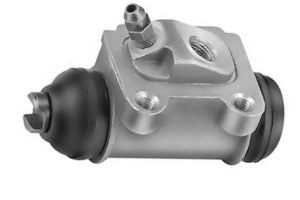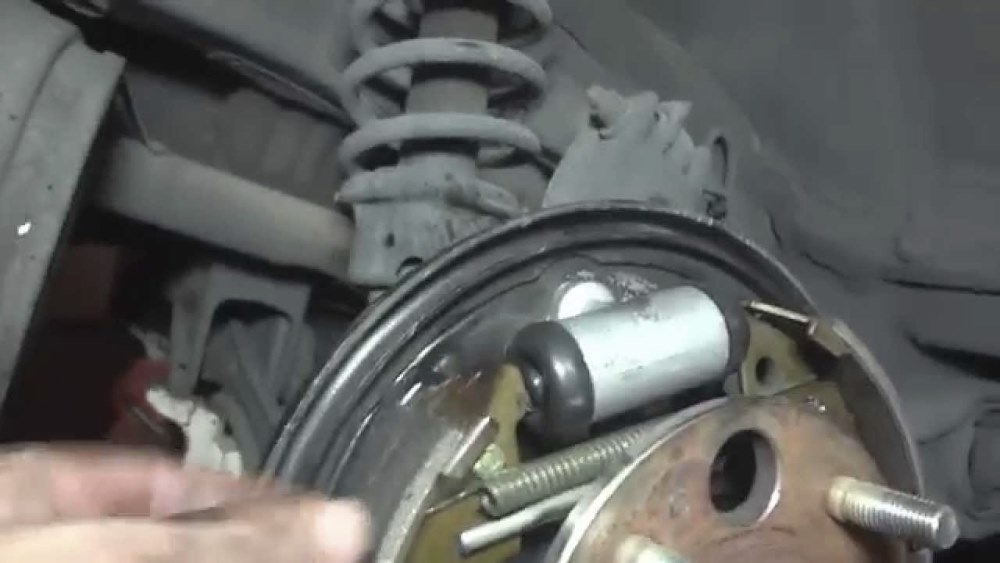What does a brake wheel cylinder do?

Brake wheel cylinders are important components in drum braking systems. They are mostly found in cars from 1999 and older. The brake wheel cylinder is usually located at the top of the wheel, slightly above the brake shoes.
The brake wheel cylinder has two pistons, one on each side. Each piston is positioned to push on the brake shoes. The brake wheel cylinder and brake shoes are connected to the brake backing plate, which holds everything in place and takes the force of braking. When the brakes are applied, the pistons push the shoes into contact with the drum. This creates friction which slows the vehicle down.
When a brake cylinder leaks it can also ruin the brake shoes, meaning that often both need to be replaced at once.
Be sure not to get the brake wheel cylinder confused with the brake master cylinder, which is used to house all the brake fluid and is used to transmit brake pedal force into brake fluid hydraulic force to the brake wheel cylinders.
Causes of a damaged brake wheel cylinder:
The brake wheel cylinder pistons have internal seals that can often leak over time, resulting in a loss of brake fluid. This is usually caused by corrosion or pitting on the brake cylinder walls, which causes the brake cylinder piston seals to wear over time.
Corrosion or pitting of the brake cylinder walls can be caused by small amounts of water moisture in the brake fluid. Brake fluid is hygroscopic which means it absorbs water moisture over time. You can avoid the costly exercise of having to replace both brake wheel cylinders and brake shoes by getting your brake fluid changed every 3 years. If you are unsure whether your car needs a brake fluid change ask your mechanic for a brake fluid moisture test, and a printout of the results.
Fast, sudden braking and excessive heat build-up in the braking system can also damage the brake wheel cylinder seals more quickly if it is done regularly.
Symptoms of a damaged brake wheel cylinder:
Brake fluid leaks – You may notice a clear fluid leaking around your car’s wheels. Check your brake fluid reservoir to see if the brake fluid level is decreasing. Please note brake fluid is highly corrosive, and will “eat paint”. If you do notice any brake fluid leaks, contact your trusted mechanics immediately, and wash any brake fluid leaks down with water. Brake fluid starts of clear in colour and feels kind of slimy to the touch. Over time as it ages it can turn into a more brown colour.
Slower braking – Your vehicle may take longer to come to a stop. This can be caused by many different brake-related problems such as a damaged brake wheel cylinder. We recommend that you fix the problem as soon as you notice it. Reduced brake effectiveness can compromise the safety of your vehicle.
You fail your Warrant of Fitness (WoF) for low braking performance, or brake imbalance.
Noise from rear brakes – A leaking wheel cylinder can result in a change in your brakes noise as the brake fluid leaks onto the brake shoes and brake drum. .
How important is a brake wheel cylinder replacement?
Like all braking components, it is vitally important that you replace the brake wheel cylinder immediately if it is causing your vehicle to brake inefficiently or to one side. Being able to stop in time may be the difference between life and death or serious injury to you or someone else.
Brake wheel cylinder replacement in Hamilton
At Grimmer Motors, we can test and if needed flush / replace your brake fluid to help prevent brake wheel cylinder failures / leaking. If necessary our experienced and qualified mechanics can replace your vehicle’s brake wheel cylinder(s). This will allow for vastly improved vehicle safety.
Our mechanics are higly experienced, qualified and skilled with brake services and can provide honest, reliable advice and service. For all brake services, diagnostics and replacements in Hamilton, contact Grimmer Motors today!

